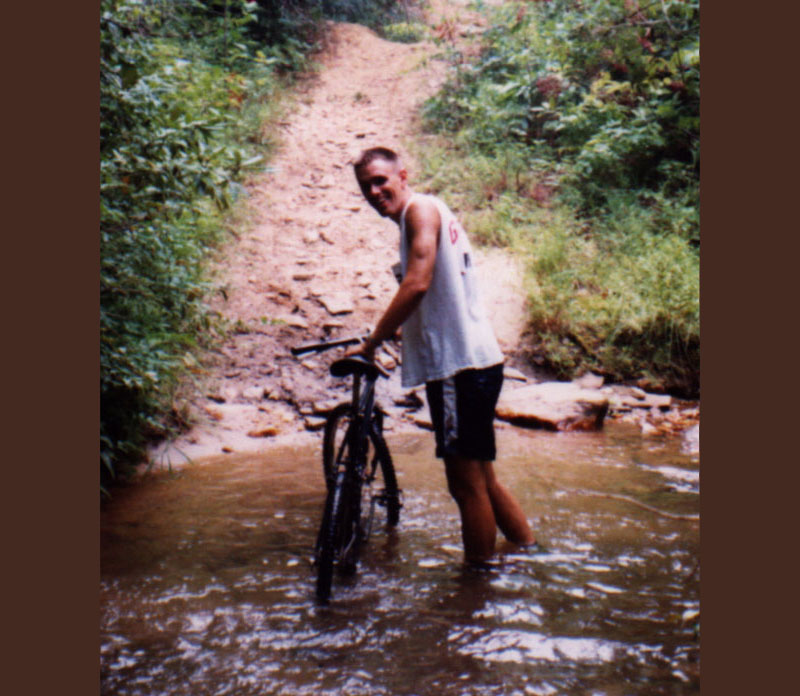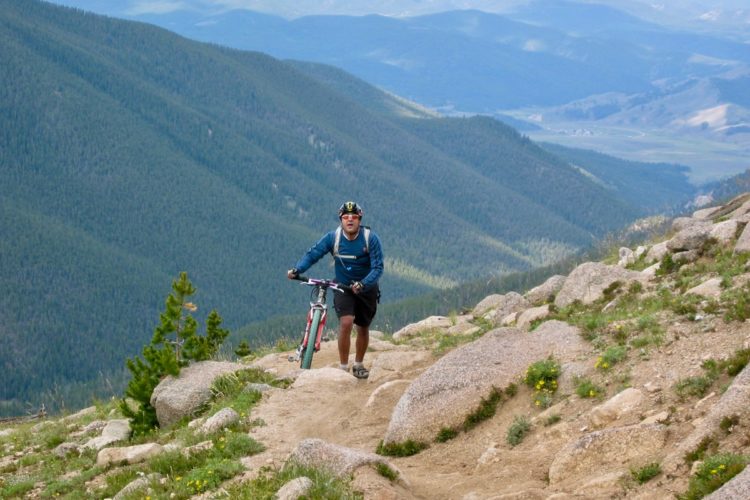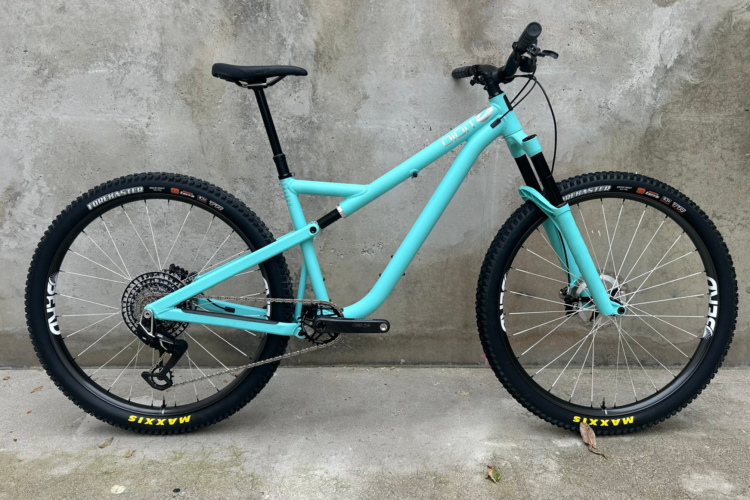
I recently had a revelation: I now know more people who used to mountain bike than people who currently ride. Whenever I meet someone and we get to talking about what we do for a living, it’s surprisingly common to learn someone was, at one time, a mountain biker. So why do people stop mountain biking? I decided to contact some riding partners from the past to find out.
High School
Back in the 1990s, more than two decades before NICA and high school mountain bike racing, my friends and I caught singletrack fever. With miles of bike-legal trails in Sumter National Forest practically right outside our back door, we loved spending Saturdays pushing ourselves to ride deeper and deeper into the woods.
Jason was one of the first in our group to get his driver’s license, and not only that, he had an actual bike rack on his car! It’s hard to remember a single high school mountain bike ride without Jason, like the time our friend Gabi got hypothermia, or the time a hunter in a tree stand fired his gun in the air because we were making too much noise.
After graduation, we all went our separate ways for college and then work. To the best of my knowledge, none of the 4-5 guys I rode with in those days still rides his mountain bike on dirt. I decided to ask Jason, who is now living in Oregon, why he stopped.
“[I] started rowing [crew] in high school and ran out of time,” said Jason. “We all just stopped going or calling each other to ride; other priorities/things seem to have taken over (i.e., other sports, women, etc.)”

In high school, everyone is still trying new things, looking for the thing that will be their thing. Some who start mountain biking will give it up quickly, which is understandable, especially if mountain biking isn’t as much fun as they thought it would be, or they find something else that’s even more fun. Still, Jason seems to have a positive impression of mountain biking that he carries with him more than 20 years later. “I would like to ride again,” said Jason. “Probably in about a decade or less when my son can ride.”
Another high school friend, Joey (who I think prefers to go by Joe or Joseph these days), had all the best intentions of sticking with mountain biking after high school, but he found there just weren’t any fun trails near him in college. He still has his bike in his DC garage, a daily reminder of a former pastime.
“I’m about to hit 40 so I want to start [mountain biking] more. […] Isn’t that what everyone says at 40?” said Joey.
Early Career
After college, I went into the US Air Force and was blessed to be stationed in Colorado Springs, CO. A good friend and co-worker, Scott, moved to the Springs from Iowa around the same time as me, and he brought his Cannondale mountain bike with him. We were both stoked to explore the Rocky Mountains on two wheels, even if the trails were much more challenging than anything either of us had ridden before.

But as they say, all good things come to an end. After riding together for three years or so, we both moved on to other places. While in Minneapolis for Frostbike a couple years ago, I got together with Scott for the first time since we both left Colorado, and was bummed to hear that he had stopped mountain biking.
“My mountain biking career […] ended rather abruptly upon my departure from the Springs,” said Scott. “There are trails worth riding around here, but I haven’t ridden a single one.”
For many mountain bikers, riding isn’t about the bike; rather, the bike is just a tool for getting outdoors and exploring. When I lived in Colorado, it seemed everyone was a mountain biker–including the overweight, chain-smoking civilians in my office. Heck, one summer a co-worker organized a trip to the Monarch Crest Trail and I was shocked that so many seemingly non-biker people came along!

But Scott was a real biker who, like Joey, just didn’t see quite the same potential for thrills in his new local trails. We were truly spoiled by the quality of the riding in Colorado, so I can understand why he has decided to sit on the sidelines. “I still have the Cannondale, but I’ve probably [only] put 100 miles on that bike since leaving Colorado [13 year ago], and most of those were with a Burley in tow.”
Scott, like many former mountain bikers I know, is finding that family commitments take up much of the time that used to be available for mountain biking. Of course, that’s not to say it’s impossible to be a great dad and a dedicated mountain biker, but ultimately there are only so many hours in the day, and we all have to prioritize. For Scott, mountain biking just isn’t as compelling as his pottery hobby or any of the other irons he has in the fire (and he always has a ton of them!).
Graduate School

After leaving the military, I went back to school for a graduate degree, and once again, I found a great group of folks who liked to ride bikes in the woods. While we did some riding (and trail running) on the trails near campus, our group also filled breaks with trips to Western North Carolina and Colorado. In fact, three of us went on a hut-to-hut trip from Durango to Moab a couple years after graduation and had a blast.
Joe is one of my closest friends from business school, and honestly, I think we kinda pressured him into taking up mountain biking with the rest of us. He jumped in head first, buying a brand new Specialized mountain bike and tackling trails from North Carolina to Colorado and Utah. During school, Joe tells me he was riding his bike every day around town, and at least a couple times a month on trail.
“[I] left the South and lived in a northern city with far less access to good trails, and [was] no longer able to ride with the group,” said Joe.
Mountain biking is a social activity, and for many of us the relationships are even more important than the trails or the bikes. Heck, this is even true for me. I have a regular Tuesday night mountain bike ride with a group of friends and if no one can make it on a particular night, I don’t bother riding, either. Now, that’s not to say one can’t find a new group to ride with in a new city–it’s just not always the same.
But there is still hope that Joe might come back one day. Although his family commitments make mountain biking a difficult sell, he does still have his mountain bike which he uses for commuting occasionally.
When I asked if he thought he might get into mountain biking again, Joe replied, “I would love to downhill (cheating, I know).” Actually, it’s not cheating, and just might be a great outlet for casually getting back into mountain biking. Apparently, Joe hasn’t heard of electric mountain bikes yet.
Neighbors
These days I tend to hear the, “I used to mountain bike” line from all sorts of people in the community, like the parents of our kids’ friends, or from guys at church. My next-door neighbor David, who I shared a fence with for more than 10 years, used to mountain bike. Or at least that’s what he told me, though I don’t think I ever saw him riding a bike. OK, I did see him tooling around his the driveway with the kids, and heck, he even rode his dirt bike around his tiny yard in the city once in a while. But for as long as I’ve known David, he hasn’t been a mountain biker.
In college, David tells me he went mountain biking once a week, but after graduation, he found his job left less time for riding. Before he knew it, “the bike was obsolete.” David’s transition was a gradual one; he didn’t stop riding all of a sudden, but just found himself riding less often until he gave it up completely. His answer hints at the fact that mountain bikes are expensive, so riders really have to stay passionate to justify such an expensive hobby.
“I still have [my] bike: a 1999 Stumpjumper,” David says.

David has three boys, and every one of them has his own dirt bike. In fact, his youngest was ripping around on a mini bike at just four years old. It’s not unusual to see the whole family pack up the trailer and head out for a day or even a weekend of out-of-town dirt bike riding. While it might seem like David and his family have found a different hobby to replace mountain biking, I’m not counting them out just yet. When I asked David if he would ever take up riding again, he said, “probably as the kids get older.”
Takeaways
While this was a fun trip down memory lane for me and a good chance to reconnect with old friends, I think everyone who has a vested interest in growing the sport of mountain biking can learn something from this. In business, they say it’s always easier to sell to former customers than to find new ones, and apparently, there are a lot of former mountain bikers out there!
As these examples show, there are many reasons people stop mountain biking, which means there are a number of major roadblocks to overcome in reactivating former riders:
- Family / time commitments
- Financial cost
- Trail access
- Lack of riding partners
- Injury
Still, these same roadblocks exist for people who have never even tried the sport, so we have the added challenge of convincing those people that mountain biking is fun in the first place. For those who are serious about growing our sport, I suggest we start by helping our former brothers and sisters get back into the fold. Note that every person I spoke with said they would be interested in getting back into mountain biking at some point, which is really half the battle. The next step is to remove whatever hurdle is preventing their return.
Today, NICA is by far the best thing going for mountain biking in terms of adding new people to the sport. Not only that, NICA appears to be re-activating high school athletes’ parents who used to be riders themselves. But what happens once those high schoolers go off to college? There is a big gap between college and becoming the parent of a high schooler. Focusing on this divide, and helping former riders overcome the roadblocks above, could radically expand the number of active mountain bikers.
















